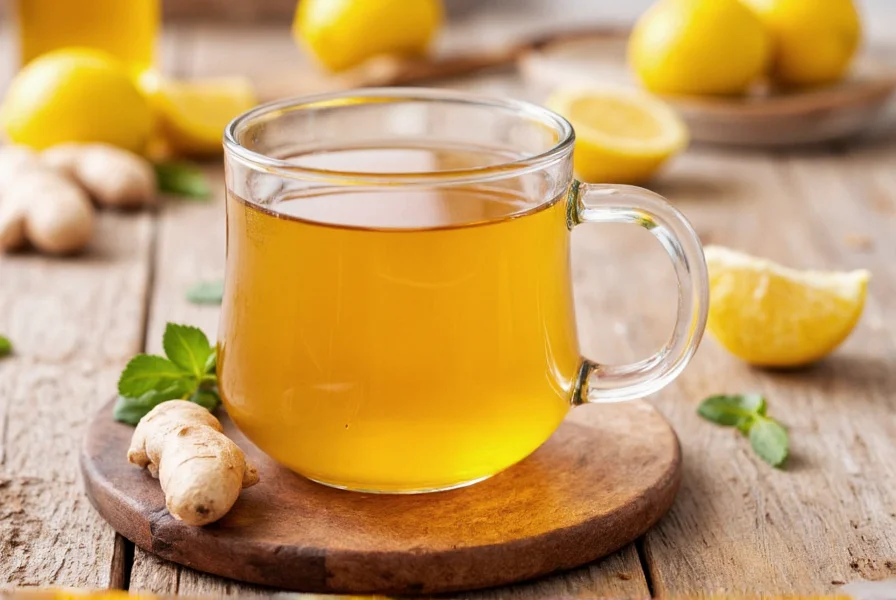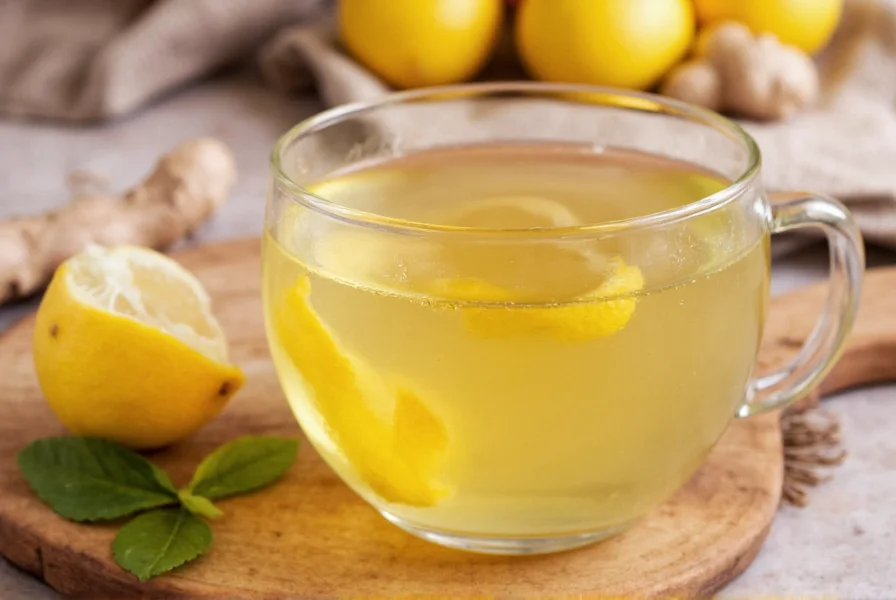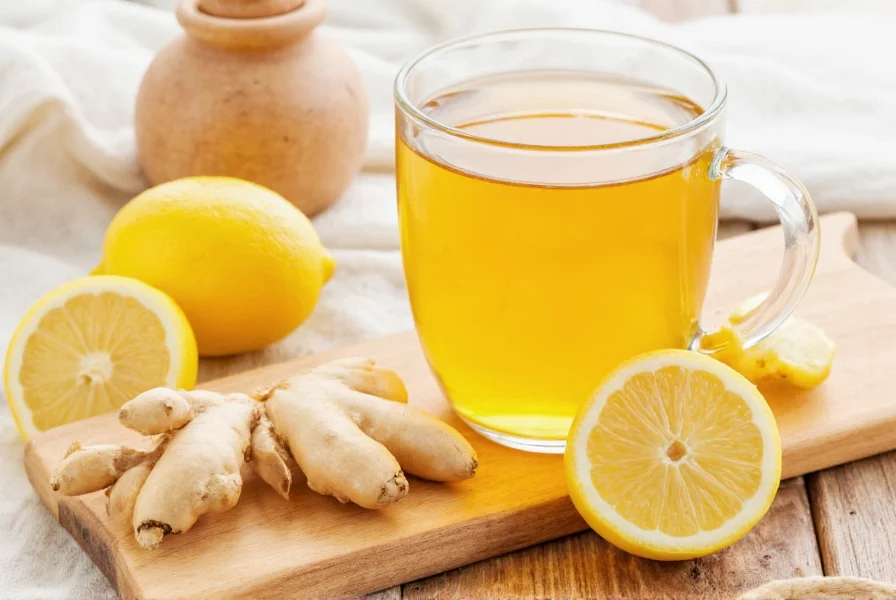Honey ginger lemon tea has gained widespread popularity as a comforting home remedy, particularly during cold and flu season. This simple yet effective beverage combines three natural ingredients known for their potential health properties. Unlike many trendy wellness drinks, this combination has roots in traditional medicine practices across various cultures, from Ayurveda to Traditional Chinese Medicine, and has increasingly attracted scientific interest.
The Science Behind Each Ingredient
Understanding what makes honey ginger lemon tea potentially beneficial requires examining each component individually:
| Ingredient | Key Compounds | Research-Supported Benefits |
|---|---|---|
| Ginger | Gingerols, shogaols | Nausea relief, anti-inflammatory effects, digestive support |
| Lemon | Vitamin C, flavonoids | Antioxidant properties, immune support, hydration |
| Honey | Antioxidants, hydrogen peroxide | Sore throat relief, cough suppression, wound healing properties |
How to Make Honey Ginger Lemon Tea: A Step-by-Step Guide
Creating an effective honey ginger lemon tea requires attention to preparation methods that preserve the beneficial compounds in each ingredient:
- Prepare fresh ginger: Peel and thinly slice 1-2 inches of fresh ginger root. For stronger tea, lightly crush the slices to release more gingerols.
- Steep properly: Add ginger to 8-12 ounces of hot (not boiling) water (170-185°F or 76-85°C). Boiling water can degrade some beneficial compounds.
- Allow sufficient time: Steep for 10-15 minutes to extract maximum benefits from the ginger.
- Add lemon last: Squeeze half a lemon into the tea after steeping. Adding lemon to very hot water may reduce vitamin C content.
- Incorporate honey correctly: Stir in 1-2 teaspoons of raw honey only after the tea has cooled slightly (below 140°F/60°C) to preserve honey's beneficial enzymes.

Evidence-Based Benefits of Honey Ginger Lemon Tea
While honey ginger lemon tea shouldn't replace medical treatment, research supports several potential benefits:
Respiratory Support
Multiple studies, including research published in the Cochrane Database of Systematic Reviews, indicate that honey can effectively reduce cough frequency and severity in children with upper respiratory infections. The World Health Organization recognizes honey as a potential demulcent for coughs. When combined with lemon's vitamin C and ginger's anti-inflammatory properties, this tea may provide soothing relief for sore throats and mild respiratory discomfort.
Digestive Wellness
Ginger has been extensively studied for its effects on digestion. A systematic review in Nutrients journal confirmed ginger's effectiveness in accelerating gastric emptying and reducing nausea. This makes honey ginger lemon tea particularly valuable for settling an upset stomach, especially when consumed 20-30 minutes before meals for preventive benefits.
Hydration and Antioxidant Support
During illness, maintaining hydration is crucial. This tea provides fluid replacement while delivering antioxidants from all three ingredients. Lemon contributes vitamin C, ginger offers gingerols with antioxidant properties, and raw honey contains various polyphenols. Unlike sugary beverages, this tea supports hydration without compromising wellness goals.
When Honey Ginger Lemon Tea May Not Be Appropriate
Despite its benefits, honey ginger lemon tea isn't suitable for everyone:
- Infants under 1 year: Honey may contain Clostridium botulinum spores that can cause infant botulism
- People with ginger sensitivity: Some individuals experience heartburn or mouth irritation from ginger
- Those managing blood sugar: The honey content adds natural sugars, requiring moderation for diabetics
- Before certain medical procedures: Ginger may increase bleeding risk, so discontinue several days before surgery
Optimizing Consumption for Maximum Benefit
The timing and frequency of consumption significantly impact the effectiveness of honey ginger lemon tea:
- For cold symptoms: Consume 3-4 times daily while symptoms persist, particularly before bed to reduce nighttime coughing
- For digestive support: Drink 20-30 minutes before meals to prepare the digestive system
- As a morning ritual: Start the day with a cup to support hydration and gentle metabolic activation
- After travel: Helps combat motion sickness and rehydrate after flights
Common Misconceptions About Honey Ginger Lemon Tea
Despite its popularity, several myths surround this beverage:
- "It can cure the common cold": While it may alleviate symptoms, no evidence shows it shortens cold duration
- "More ginger equals better results": Excessive ginger (more than 4 grams daily) may cause digestive upset
- "Any honey works the same": Raw, unprocessed honey retains more beneficial compounds than processed varieties
- "It's equally effective hot or cold": Heat enhances ginger compound extraction but degrades some lemon nutrients
Comparing Honey Ginger Lemon Tea to Other Remedies
Understanding how honey ginger lemon tea compares to similar options helps determine when it's the best choice:
- Versus plain ginger tea: The addition of honey and lemon provides broader symptom relief, particularly for sore throats
- Versus over-the-counter cough syrups: While less potent for severe symptoms, it avoids potential medication side effects
- Versus vitamin C supplements: Provides vitamin C along with other beneficial compounds in a hydrating format
- Versus commercial "immune boost" drinks: Contains no added sugars or artificial ingredients found in many commercial products

Creating Variations for Specific Needs
You can modify the basic honey ginger lemon tea recipe to address specific concerns:
- For congestion: Add a pinch of cayenne pepper to help clear nasal passages
- For immune support: Include a slice of turmeric root for additional anti-inflammatory benefits
- For relaxation: Add a sprig of fresh mint to create a calming effect
- For enhanced digestion: Include a few fennel seeds during steeping
- For reduced sugar intake: Use half the honey and add a small piece of stevia leaf
Conclusion: A Time-Tested Remedy with Modern Validation
Honey ginger lemon tea represents a harmonious blend of traditional wisdom and modern scientific understanding. While not a miracle cure, its combination of hydration, soothing properties, and evidence-supported benefits makes it a valuable addition to wellness routines. By preparing it correctly and understanding its appropriate uses, you can maximize the potential benefits while avoiding common pitfalls. As with any natural remedy, consistency and proper usage matter more than expecting immediate dramatic results.
Does honey ginger lemon tea really help with colds?
Honey ginger lemon tea doesn't cure colds but can help alleviate symptoms. Research shows honey effectively reduces cough frequency and severity, particularly in children. Ginger may help with nausea sometimes accompanying colds, while lemon provides hydration and vitamin C. The warmth of the tea also soothes sore throats. For best results, drink it 3-4 times daily while symptoms persist.
How much honey ginger lemon tea should I drink per day?
For general wellness, 1-2 cups daily is sufficient. When addressing specific symptoms like a sore throat or mild nausea, you can safely consume 3-4 cups throughout the day. However, don't exceed 4 grams of ginger daily (about 2 inches of fresh root per cup), and limit honey to 1-2 teaspoons per serving to avoid excessive sugar intake. Those with medical conditions should consult their healthcare provider.
Can I make honey ginger lemon tea with dried ginger?
Yes, you can use dried ginger powder or dried ginger slices, though fresh ginger generally provides more potent benefits. If using dried ginger, use about 1/4 to 1/2 teaspoon of powder or 1 teaspoon of dried slices per cup. Note that dried ginger may have slightly different compound concentrations than fresh, so you might need to adjust the amount based on your taste preference and desired strength.
When is the best time to drink honey ginger lemon tea?
The optimal timing depends on your purpose: drink 20-30 minutes before meals for digestive support, before bedtime to reduce nighttime coughing, first thing in the morning for hydration and gentle metabolic activation, or after travel to combat motion sickness. For cold symptoms, space consumption throughout the day (every 4-6 hours) for continuous symptom relief.
Why shouldn't I add honey to boiling water in honey ginger lemon tea?
Adding honey to boiling water (above 140°F/60°C) destroys beneficial enzymes and reduces its therapeutic properties. The heat degrades hydrogen peroxide and other compounds responsible for honey's antimicrobial effects. For maximum benefit, add honey after the tea has cooled slightly, ideally when it's warm but not hot to the touch. This preserves the raw honey's beneficial components while still allowing it to dissolve properly.











 浙公网安备
33010002000092号
浙公网安备
33010002000092号 浙B2-20120091-4
浙B2-20120091-4